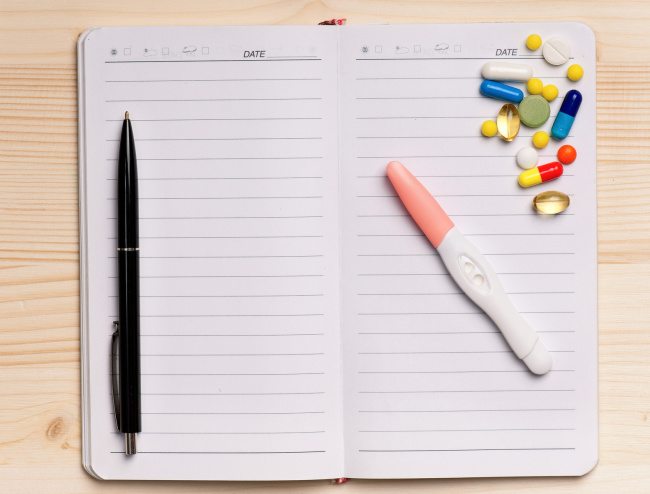Watch your weight
“Most importantly, if you’re overweight, get started on a reasonable regime of weight reduction. That is one of the most common reasons for infertility,” said Dr. Michael Covlin, MD Ob/Gyn at Heartland Women’s Health in Marion. “Weight control is huge, as is decreasing the amount of insulin in your system, and that’s done by reducing the amount of sugar and carbohydrates in your diet.”
In one study, researchers evaluated the body mass index of more than 2 000 pregnant women. They found that women who were overweight or obese (BMI of 25 to 39) took twice as long to get pregnant and women who were underweight (BMI of 19 or less) took four times as long.
“Women definitely need to stay at a healthy weight when trying to conceive,” Dr. Covlin said.
And what you drink
Drinking too much coffee or other caffeine drinks can contribute to infertility by decreasing the amount of vitamins and nutrients in a woman’s body. You don’t have to give it up completely, just stay under 250 milligrams of caffeine a day to be sure.
Moderation is also the key to alcohol consumption when trying to get pregnant – no more than one drink per day. But once you are pregnant, alcohol should be avoided completely as it has been proven to increase the risk of serious birth defects.
Stop smoking
Smoking can impair both a woman and a man’s fertility, and smoking while pregnant has been proven to increase the risk of miscarriage.
Supplements can help
Dr. Michael Colvin at Heartland Women’s Health in Marion, recommends supplementing a nutritious diet with Vitamin D, Iodine and Magnesium. “Deficiencies in these nutrients can contribute to infertility and are pretty common,” he said.
Herbs that promote hormonal balance, regular ovulation, and proper circulation may help, also, but should only be taken under the supervision of your Ob/Gyn. Here are a few that you could talk about trying:
- Black Cohosh root (Actaea racemosa) promotes regulation of the entire menstrual cycle and is excellent for relieving ovarian pain.
- Blue Cohosh rhizome and root (Caulophyllum thalictroides) is both an ovarian and uterine tonic that aids in regulation of the entire menstrual cycle.
- Maca root (Lepidium meyenii) is a nourishing food for the endocrine system, aiding both the pituitary, adrenal, and thyroid glands (all involved in hormonal balance). It supports overall hormonal balance, works to balance oestrogen/progesterone levels and is good for overall menstrual cycle support.
- Milk Thistle seed (Silybum marianum) supports hormonal balance. It is one of the best plants for liver health, which is vital for hormonal balance. The liver helps to filter toxins from the body, including excess hormones.
- Tribulus, aerial parts and fruit (Tribulus terrestris) may normalize ovulation in infertile women when used prior to ovulation. Tribulus has also been found to be a nourishing tonic for the female reproductive system as a whole, especially concerning the ovaries.
- Vitex, Chaste tree berry (Vitex agnus-castus) is an effective aid in regulating hormonal balance. It also promotes ovulation and improves timing of the menstrual cycle.
- Wild Yam root (Dioscorea villosa) promotes healthy menstrual cycles and reduces ovarian pain.
- Yarrow aerial parts (Achillea millefolium) relieves pelvic congestion and improves the entire menstrual cycle timing.
Chart your ovulation
Ovulation occurs about 14 days before the menstrual period is due. Couples often wait until the day of ovulation or later to have intercourse. But if you really want to get pregnant, err on the early side.
Have frequent sex
Delaying lovemaking won’t help your chances of conception. In fact, waiting more than five days may decrease the sperm count. “Couples trying to conceive should have sex at least every other day,” Dr. Covlin said.
Choose lubricants wisely
“Water-based lubricants are best,” said Dr. Covlin. “Still, some can inhibit sperm mobility, so check with your Ob/Gyn first.” Some lubricants can actually decrease fertility, such as soap. When you’re trying to get pregnant, be sure to avoid products that have sper-micidal agents. Conceive Plus fertility lubricant has been cleared by the FDA and is safe to use when you are trying to get pregnant (www.conceiveplus.com).
Just relax and don’t stress out
“Remember that if all is in order, you’ve got a three percent chance of getting pregnant with each ovulation cycle,” Dr. Covlin said. “About 85% of couples who follow these simple rules will conceive within a year, 95% within two years. But if you’ve been trying for a year without results, consult your Ob/Gyn.”
About the Author: For more information, visit the Conceive Plus website or Facebook page https://www.facebook.com/conceiveplusSA.
Latest posts by Contributor (see all)
- Practical advice for keeping your toddler safe around the pool - December 18, 2014
- Is your pool toddler-proof? - December 18, 2014
- Is it worth it? - December 18, 2014
-
No Comments" href="https://all4baby.co.za/falling-pregnant/fertility-101/2558/conception-fact-pre-pregnancy-weight-affects-developing-embryo/">

Conception fact: Pre-pregnancy weight affects developing embryo
-
No Comments" href="https://all4baby.co.za/falling-pregnant/fertility-101/2555/fertility-signs-tell-fertile/">

Fertility tests: How to tell if you are fertile?
-
No Comments" href="https://all4baby.co.za/falling-pregnant/challenges/2382/obesity-fertility-whats-link/">

Obesity and fertility – what’s the link?
-
No Comments" href="https://all4baby.co.za/falling-pregnant/fertility-101/2375/fertility-may-benefit-aromatherapy/">

How your fertility may benefit from aromatherapy


 Saving...
Saving...